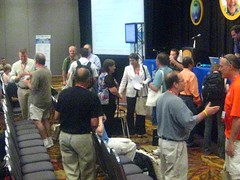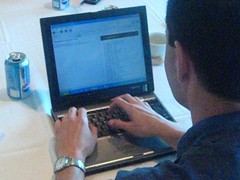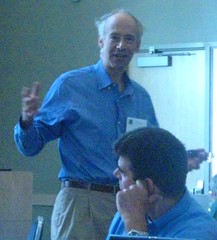 I’m up at 5:30 and wondering what I should do with the couple of hours I have before heading to the airport. As I am not yet through preparing for my work in Vermont, am in the middle of two formal writing projects, and haven’t packed yet, I guess I’ll blog, and finally offer up some thoughts about NECC — before it fades too far into the past.
I’m up at 5:30 and wondering what I should do with the couple of hours I have before heading to the airport. As I am not yet through preparing for my work in Vermont, am in the middle of two formal writing projects, and haven’t packed yet, I guess I’ll blog, and finally offer up some thoughts about NECC — before it fades too far into the past.
First of all, it was a great conference, perhaps not quite so great as Atlanta, but very close. It was multidimensional, in ways that other conferences aren’t or can’t be, and in a way that NECC seemed to fully achieve in ’07 — at least that was the first time I noticed it. By multidimensional, I mean that there were many directions in which to turn, in order to learn. If there weren’t any sessions of interest to attend, which for me never happened, then you could visit the playgrounds, or one of the lounges, or the poster sessions — which were a high point for me.
And there was the blogger’s cafe, which was, more than anything else, just a cool place to be and talk and learn, rather than a quiet place to go blog. And then there were the many alternative blogger cafes that emerged for bloggers to go and do their thing. I missed most of those.
I did not get nearly as much time in the exhibit hall as I usually spend, but was able to get through most of it, looking for new things. What’s new? Social Networks. Am I impressed? Nope! What struck me the most was seeing Terrapin Logo and MicroWorlds. What impressed me was that these were applications from the past, not the future. You’re welcome to chime in here, Stager 😉
At any rate, it was a conference that glowed, in that there was teaching, learning, and conversation; and much of that teaching, learning, and conversation was electrified with tiny bits that transcended time and space. Here are a few statistics gathered in only the ways I know how to gather them:
- We seemed to have blogged less. I found evidence of 252 blog entries tagged with necc08, while last year there were 394 tagged with necc07. This could include post event blogs that simply haven’t occurred yet for San Antonio, but I suspect that there were other avenues of expression that became an alternative to blogging this year.
- At the point that I collected this data (Thursday morning, the day after the conference), 4,452 Twitter posts had been submitted, hashed with NECC, going back four days.
- I was most taken with CoverItLive, a free service that allows the live note taking within a blog entry, and commenting on the notes in real time. I was quite impressed with this, as I found conversations forming around my live notes, including people who were also in the session, in other sessions, sitting out in the bloggers cafe, or as far away as the Gold Coast of Australia. However, Stephanie Sandifer and I were the on attendees who used it, as far as I could gather.
- Ning was also a larger success than I’d anticipated. At the end of the conference, the NECC Ning enjoyed 1,944 members, who’d generated 119 general discussions, 117 session discussions, and had uploaded 72 videos.
- It only just occurred to me to cound Flickr uploads. Listing photos tagged with necc08, the upload count is 2,798. That’s practically another NECC. Of course some of them are also labeled dude ranch.
There also seemed to be more controversy at NECC this year, starting with a back lash over the presence of Pearson Publishing at the EduBloggerCon, and their use of some admittedly intrusive recording equipment. Steve Hargadon accepted blame for this, as he had not fully understood their intent, when he gave them permission to work the event. It didn’t bother me. I guess I’m not so quick to villainize. It’s probably naivet?. But, hey, we’re all making a living, and there are teachers out there who are happy too limit their concerns to teaching to the test. The problem is not with those who profit from NCLB. The problem is that it exists, and we, as an institution, accepted it.
I was also conscious of a number of conversations among educators who were attending NECC from outside the U.S., and their dissatisfaction with the air of the event. Principally, they pointed out a focus on the technology, to the exclusion of conversations about what should be done with it. Well this is an old and ongoing complaint of many of us, along with the lack of innovation that was also eluded to. I’ve attended conferences in Scotland, Canada, and New Zealand, and I agree that in comparison….. Well, it’s my opinion that an education system that has been forced to care more about what our children are learning, rather than how they are learning it, is required to mechanize rather than innovate. This, I believe, is a fatal error on our part, and I am thankful for the gracious (and sometimes less than gracious) observations shared by our global brothers and sisters.
A high point was realizing that two of the educators who received awards and recognition during the second keynote were Class Blogmeister users. Neat!
My main takeaways were the conversations and the one liners — that statement which said so much. Among them were…
- When Michael Huffman, of the Indiana Department of Education, said, in his narrative about the learning that is happening in their 1:1 open source classrooms, “our students are using their teachers.” “Using” is new learning. “Listening to…” is old learning.
- Then there was Leslie Fisher’s presentation on World of Warcraft. First of all, no one should have that much fun doing their job. Leslie loves what she does, and it’s contagious. But she told a story during her session that really stuck with me. It was about a conversation she’d had with a mom, who had been listening in on her sons involvement in a World of Warcraft Raid. She said, that after the team’s conversation about that raid, their debriefing, which the mother overheard, the mother told her son that the discussion was exactly the same kind of conversation that she, a corporate executive, had every day at work.
- During the Machinima session, paneled by Bernajean Porter, Kevin Jarrett, and others, Peggy Sheehy made an interesting distinction between her students approach to making standard camera-based videos, and their work in constructing machinimas. She said that in making videos, they tended to focus on themselves, what they would say. In creating machinima, they would say, “How should I communicate this idea?” Way more powerful, thoughtful, and literacy building.
- Bernajean Porter, in that same session, talked about their efforts to conduct the project, having students create multimedia reports, using Ramapo Island in Second Life’s Teen Grid, as a place for collaboration and a palette for expressing their learning. She described difficulties the students had in finding opportunities to do their work, having to use lunch time and other narrow corridors of time and space between formal learning. Porter said, “It shouldn’t be that hard for students to be creative.” Wow!
So, there is much more to say, and I may get around to it, and I may not. Right now, it’s time to focus on this week’s leadership symposium in Burlington, Vermont.
 I’ve already been home for a full day, after a late but sure return from Madison and the Games+Learning+Society Conference last week. I’ll have much to write about that later, but my main (and only) regret is not getting to see Stephen Downes opening presentation, which he apparently gave from the stairwell of his hotel in the Canary Islands.
I’ve already been home for a full day, after a late but sure return from Madison and the Games+Learning+Society Conference last week. I’ll have much to write about that later, but my main (and only) regret is not getting to see Stephen Downes opening presentation, which he apparently gave from the stairwell of his hotel in the Canary Islands.
 I had lunch at a table with a wide variety of folks, including a history teacher. We obviously hit it off, especially when he said that he was having his students create historical simulations. The twist, though, is that they are text-based.
I had lunch at a table with a wide variety of folks, including a history teacher. We obviously hit it off, especially when he said that he was having his students create historical simulations. The twist, though, is that they are text-based. I’m sitting in a meeting room in Burlington, Vermont for the LEAD IT Summer Symposium. Jim Moulton and I did an unconference style session this morning about school 2.0. We started by showing the EPIC 2015 video and then asking participants to brainstorm about their fifth grade daughter, who will graduate in 2015,
I’m sitting in a meeting room in Burlington, Vermont for the LEAD IT Summer Symposium. Jim Moulton and I did an unconference style session this morning about school 2.0. We started by showing the EPIC 2015 video and then asking participants to brainstorm about their fifth grade daughter, who will graduate in 2015,
 I’m up at 5:30 and wondering what I should do with the couple of hours I have before heading to the airport. As I am not yet through preparing for my work in Vermont, am in the middle of two formal writing projects, and haven’t packed yet, I guess I’ll blog, and finally offer up some thoughts about NECC — before it fades too far into the past.
I’m up at 5:30 and wondering what I should do with the couple of hours I have before heading to the airport. As I am not yet through preparing for my work in Vermont, am in the middle of two formal writing projects, and haven’t packed yet, I guess I’ll blog, and finally offer up some thoughts about NECC — before it fades too far into the past. These are not efforts, however, to please the students. It’s a growing believe that to prepare our children for their future, we have to understand them and to teach from their perspective, through their lenses, as they look to their future. I’ve written before about the incridible things I’ve seen in each of these countries, practices that would be labeled as “risk-taking” and even “counter-productive” in mine.
These are not efforts, however, to please the students. It’s a growing believe that to prepare our children for their future, we have to understand them and to teach from their perspective, through their lenses, as they look to their future. I’ve written before about the incridible things I’ve seen in each of these countries, practices that would be labeled as “risk-taking” and even “counter-productive” in mine.